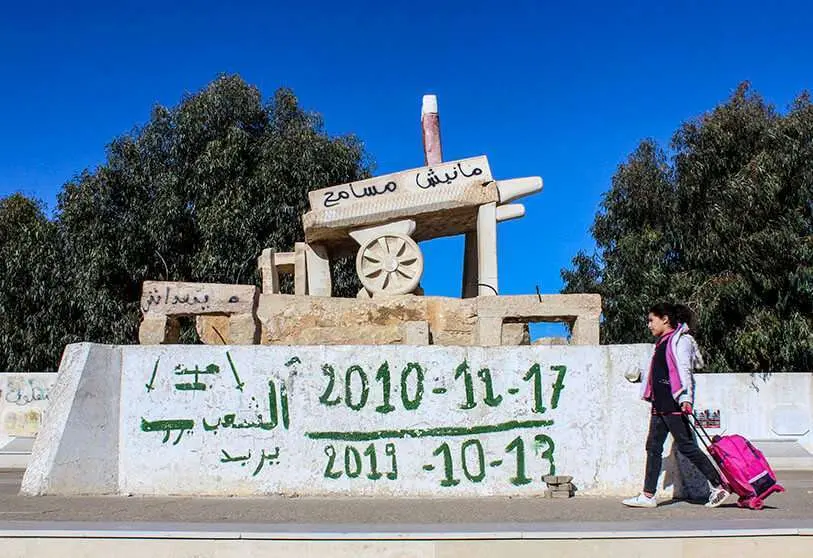Tunisia must be helped

That geography has a strong impact on politics is a truism, and some countries are luckier than others. In some cases history allies with geography to place small countries between two large ones, such as Uruguay, between Argentina and Brazil, or Tunisia between Algeria and Libya, which on top of that are countries with serious problems, to put it kindly. When this happens, the small country finds it difficult to avoid being hit by the shocks that affect its larger neighbours, and this is also happening to Tunisia.
Tunisia was the cradle of the Arab Spring when in December 2010 a policewoman commandeered Mohamed Bouazizi's street cart and slapped him in the face - an Arab slapped in public by a woman! Bouazizi, humiliated and desperate, set himself on fire and his death sparked protests on such a scale that they swept away the dictatorial and corrupt regime of Ben Ali, who fled to Saudi Arabia where he died years later, while the revolt spread across the Arab world, toppling Gaddafi and Mubarak, leading to wars in Yemen and Syria, revolts in Lebanon and Bahrain, and the smartest of the class like Morocco's Mohammed VI and Jordan's Abdullah made cosmetic changes to follow. Algeria was spared because the civil war that bloodied the country for ten years and left 200,000 dead was still alive. Tunisia's fuse set fire to an Arab world yearning for freedom and dignity in what was called the Arab Spring, which today has turned into a dull autumn because in peoples with no democratic tradition these yearnings were snatched away by the only existing realities: the tribal and religious realities of the Muslim Brotherhood.
Tunisia was a case apart because democracy managed to establish itself there despite the difficulties and the scant help it received from Europe and the US, beyond pats on the back and well-meaning words of encouragement. Also some security cooperation... because it is in our interest as well. Then the lack of economic prospects and the neighbourhood of a Libya in flames created problems of terrorism that negatively affected tourism, the main source of foreign exchange for a country that has been characterised by tolerance and openness since the time of founder Burguiba. And many young people took their desperation and idealism to join the ranks of Daesh or Al-Qaeda in numbers disproportionate to their population. Still, Tunisia managed to draft a democratic constitution, held free elections, the Islamist party stepped back to allow secular governments, and its human rights organisations were awarded the Nobel Peace Prize. There was hope.
Now, the COVID-19 pandemic has made everything more difficult with a further drop in tourism and migrant remittances and rising unemployment, which now reaches 16.5% of the population, but rises to 36% among 15-24 year olds, explaining the many deaths in the country, which explains the many migrants trying to reach Italian shores in search of what they imagine to be a better life. Debt is soaring, the economy has contracted by 7% in 2020 and the budget deficit has reached 14%. And in this context, new popular uprisings have broken out and spread throughout the country, despite the fact that they are not caused by economic hardship, as might be expected, but by another police mistreatment, this time of a simple shepherd in Siliana, a town located a hundred kilometres from the capital.
Prime Minister Mechichi, an independent who leads President Saied's third government since 2019, has said that the demands of the rioters are legitimate and deserve to be heard, but the repression has nevertheless been harsh and fears are growing that the country is gradually sliding towards a progressively more authoritarian model, supported by people who have already forgotten the excesses and corruption of the Ben Ali era because they unfortunately still exist today and who, on the contrary, miss the stability and peace that the authoritarian regime provided. That is why the Free Desturian Party is now leading in the polls. Its leader Abir Moussi, a former supporter of Ben Ali, preaches stability and authority and exploits to his advantage the fact that the fact that freedom without economic possibilities and empty stomachs is just empty talk. This is why there are worrying signs that Tunisia could begin to lean towards the authoritarian regimes that have been in vogue around the world and have been growing for years to the detriment of democracies. If we really care about Tunisia, we in Europe need to help it because it deserves it and because in doing so we will be helping ourselves, since the stability of the Maghreb is essential for our own security.
Jorge Dezcallar

